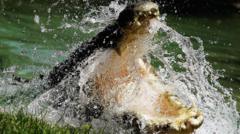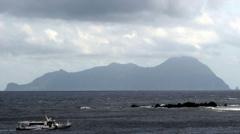The Northern Territory of Australia grapples with a significant crocodile population, balancing public safety and environmental conservation amid rising numbers and public interest in tourism.
Crocodile Conundrum: Balancing Safety and Conservation in Darwin

Crocodile Conundrum: Balancing Safety and Conservation in Darwin
Exploring the complexities of managing saltwater crocodile populations in Australia's Northern Territory.
In the heart of Australia's Northern Territory (NT), where saltwater crocodiles thrive, government ranger Kelly Ewin finds himself at dawn on Darwin Harbour, poised delicately on a floating trap. The silence of the boat contrasts sharply with the sporadic splashing of the agitated reptile inside. “You get pretty much zero chances with these guys,” Ewin remarks, as he skillfully attempts to secure the creature.
Darwin, a coastal city enveloped by wetlands and beaches, is home to an estimated 100,000 wild saltwater crocodiles, more than any other region worldwide. While the saltwater crocodile, colloquially referred to as 'salties' by locals, was once nearly hunted to extinction due to rampant skin trade post-World War II, a hunting ban established in 1971 has seen their population rebound dramatically. Now a protected species, they are no longer threatened but managing their burgeoning numbers poses new challenges for local authorities and the community.
“The worst thing that can happen is when the public turns against them,” warns croc expert Prof. Grahame Webb. Knee-jerk political reactions could lead to detrimental policies impacting both humans and crocodiles alike. The territory's warm climate and ample waterways provide ideal habitats for these cold-blooded predators that are known for their tenacity.
Throughout the breeding season, typically marked by increased crocodile activity, Ewin's team undertakes rigorous checks on 24 trapping sites around Darwin. Recreational fishing and swimming are common in this region, which intensifies the urgency of the ranger's mission. Crocodiles deemed dangerous are frequently culled to minimise risks; relocating them often leads to their return.
Public education initiatives, such as the NT government's "Be Crocwise" program, aim to inform locals about safe practices in crocodile territory. Success in education has drawn interest from international regions like Florida and the Philippines, demonstrating the potential for respectful coexistence between humans and wildlife.
While culling is not currently advocated due to the crocodile's protected status, a new 10-year crocodile management plan was enacted last year, increasing the annual quota of croc removals from 300 to 1,200, alongside ongoing removal efforts by Ewin's team.
Debates surrounding crocodile interactions with people often flare up following incidents, such as last year's tragic death of a 12-year-old girl. Following such events, public outcry can prompt political leaders like the former NT head Eva Lawler to assert that crocodile populations should never surpass that of humans, currently standing at 250,000 in the NT, significantly lower than that of crocs.
The situation in NT also highlights wider discussions about crocodile populations in Queensland, where fewer crocodiles coexist with a higher number of tourists, leading to more frequent incidents and calls for culling.
Despite the controversies, crocodiles also represent a lucrative aspect of local tourism and fashion. Tourists flock to activities showcasing crocodile behaviors, such as “croc jumping,” while luxury brands, driven by high demand for crocodile leather, invest in the local crocodile farming industry.
Approximately 150,000 crocs now inhabit captivity in the NT, significantly contributing to the economy despite some criticism of farming practices, particularly concerns surrounding the welfare of captured crocodiles.
Indigenous communities play a vital role in the industry, with partnerships forming around sustainable crocodile management that acknowledges traditional relations with these creatures. Local Traditional Owner Otto Bulmaniya Campion underscores the importance of involving Indigenous perspectives in the benefits of crocodile harvesting.
As Darwin grapples with its formidable reptilian inhabitants, the complexity of preserving both human safety and the ecological role of crocodiles remains critical. Prof. Webb's blunt assessment of the risks drowning in the waters near Darwin - stating, “If you go swimming in the Adelaide River, there's a 100% chance you'll be killed” - starkly invokes the reality of living alongside such powerful predators.
In striking a balance between safety, conservation, and economic development, the Northern Territory is navigating a multifaceted relationship with one of nature's most formidable creatures, defining a way of life that promises to persist amid contemporary challenges.



















